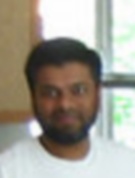by Asim Jalis
Here is an excellent discussion of Godel's Incompleteness Theorem
by George Green:
Link to http://www.sciencechat.org.
George Green writes:
> For any [consistent, recursive] axiom-set S, of sufficient
> strength (to have a godel sentence), there is a sentence G(S)
> that is true in some models M(S) and false in some other
> models M(S) (this [along with the completeness theorem] is why
> G(S) is not provable from S). In Godel's original proof, S is
> PA, M(S) is N, and G(S) is "PA is consistent".
> [Godel's theorem] means that if you have an intended model
> (like N) in mind, then you can't always get what you want (a
> proof, from your preferred recursive axiom-set, of Any old
> truth in this model). It also means that some of the true (in
> N) sentences that you CAN prove are going to have proofs that
> are RIDICULOUSLY longer than the length of those true
> sentences.
> From the viewpoint of PA, it may well be that both Fermat's
> Last Theorem and Goldbach's conjecture are "like G". [G is the
> Godel sentence.] At any given stage of the process, things that
> are "like G" (in the sense that they are Pi_1 sentences that
> are true in your intended model but that you can't prove from
> your axioms) may be abundant. All this means is that if your
> intended/standard model really is that much more important to
> you than all the other models, then you need more axioms to
> approximate it. But it also means that approximation is what
> you will have to settle for (no amount of axioms will get you
> all the way there, if your axioms are simple enough that you
> can recognize one in recursive time).
Godel showed that the statement G is true in N (the numbers) but
not derivable from PA.


